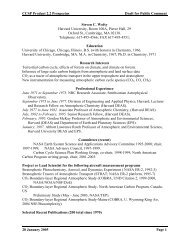Decision support experiments and evaluations using seasonal to ...
Decision support experiments and evaluations using seasonal to ...
Decision support experiments and evaluations using seasonal to ...
Create successful ePaper yourself
Turn your PDF publications into a flip-book with our unique Google optimized e-Paper software.
The U.S. Climate Change Science Program<br />
User-driven<br />
information in regard<br />
<strong>to</strong> <strong>seasonal</strong>-<strong>to</strong>-<br />
interannual climate<br />
variability for water<br />
resources decision<br />
making must be<br />
salient, credible,<br />
<strong>and</strong> legitimate.<br />
122<br />
technologies” (Cash <strong>and</strong> Buizer, 2005; Sarewitz<br />
<strong>and</strong> Pielke, 2007).<br />
In sum, there is an emerging consensus that<br />
the utility of information intended <strong>to</strong> make<br />
possible sustainable environmental decisions<br />
depends on the “dynamics of the decision context<br />
<strong>and</strong> its broader social setting” (Jasanoff<br />
<strong>and</strong> Wynne, 1998; Pielke et al., 2000; Sarewitz<br />
<strong>and</strong> Pielke, 2007). Usefulness is not inherent<br />
in the knowledge generated by forecasters—<br />
the information generated must be “socially<br />
robust”. Robustness is determined by how well<br />
it meets three criteria: (1) is it valid outside,<br />
as well as inside the labora<strong>to</strong>ry; (2) is validity<br />
achieved through involving an extended group<br />
of experts, including lay “experts;” <strong>and</strong> 3) is the<br />
information (e.g., forecast models) derived from<br />
a process in which society has participated as<br />
this ensures that the information is less likely<br />
<strong>to</strong> be contested (Gibbons, 1999).<br />
Finally, a user-driven information system relies<br />
heavily on two-way communication. Such communication<br />
can help bridge gaps between what<br />
is produced <strong>and</strong> what is likely <strong>to</strong> be used, thus<br />
ensuring that scientists produce products that<br />
are recognized by the users, <strong>and</strong> not just the<br />
producers, as useful. Effective user-oriented<br />
two-way communication can increase users’<br />
underst<strong>and</strong>ing of how they could use climate<br />
information <strong>and</strong> enable them <strong>to</strong> ask questions<br />
about information that is uncertain or in dispute.<br />
It also affords an opportunity <strong>to</strong> produce<br />
“decision-relevant” information that might<br />
otherwise not be produced because scientists<br />
may not have unders<strong>to</strong>od completely what kinds<br />
of information would be most useful <strong>to</strong> water<br />
resource decision makers (NRC, 2008).<br />
In conclusion, user-driven information in regard<br />
<strong>to</strong> <strong>seasonal</strong>-<strong>to</strong>-interannual climate variability<br />
for water resources decision making must be<br />
salient (e.g., decision-relevant <strong>and</strong> timely),<br />
credible (viewed as accurate, valid, <strong>and</strong> of high<br />
quality), <strong>and</strong> legitimate (uninfluenced by pressures<br />
or other sources of bias) (see NRC, 2008;<br />
NRC, 2005). In the words of a recent National<br />
Research Council report, broad involvement<br />
of “interested <strong>and</strong> affected parties” in framing<br />
scientific questions helps ensure that the science<br />
produced is useful (“getting the right science”)<br />
by ensuring that decision-<strong>support</strong> <strong>to</strong>ols are<br />
explicit about any simplifying assumptions that<br />
may be in dispute among the users, <strong>and</strong> accessible<br />
<strong>to</strong> the end-user (NRC, 2008).<br />
4.3.5 Proactive Leadership—<br />
Championing Change<br />
Organizations—public, private, scientific, <strong>and</strong><br />
political—have leaders: individuals charged<br />
with authority, <strong>and</strong> span of control, over important<br />
personnel, budgetary, <strong>and</strong> strategic planning<br />
decisions, among other venues. Boundary<br />
organizations require a kind of leadership called<br />
inclusive management practice by its principal<br />
theorists (Feldman <strong>and</strong> Khademian, 2004). Inclusive<br />
management is defined as management<br />
that seeks <strong>to</strong> incorporate the knowledge, skills,<br />
resources, <strong>and</strong> perspectives of several ac<strong>to</strong>rs<br />
<strong>and</strong> seeks <strong>to</strong> avoid creating “winners <strong>and</strong> losers”<br />
among stakeholders.<br />
While there is an enormous literature on<br />
organizational leadership, synthetic studies—<br />
those that take various theories <strong>and</strong> models<br />
about leaders <strong>and</strong> try <strong>to</strong> draw practical, even<br />
anecdotal, lessons for organizations—appear <strong>to</strong><br />
coalesce around the idea that inclusive leaders<br />
have context-specific skills that emerge through<br />
a combination of tested experience within a variety<br />
of organizations, <strong>and</strong> a knack for judgment<br />
(Bennis, 2003; Feldman <strong>and</strong> Khademan, 2004;<br />
Tichy <strong>and</strong> Bennis, 2007). These skills evolve<br />
through trial <strong>and</strong> error <strong>and</strong> social learning.<br />
Effective “change-agent” leaders have a guiding<br />
vision that sustains them through difficult<br />
times, a passion for their work <strong>and</strong> an inherent<br />
belief in its importance, <strong>and</strong> a basic integrity <strong>to</strong>ward<br />
the way in which they interact with people<br />
<strong>and</strong> approach their jobs (Bennis, 2003).<br />
While it is difficult <strong>to</strong> discuss leadership<br />
without foc<strong>using</strong> on individual leaders (<strong>and</strong><br />
difficult <strong>to</strong> disagree with claims about virtuous<br />
leadership), inclusive management also embraces<br />
the notion of “process accountability”:<br />
that leadership is embodied in the methods by<br />
which organizations make decisions, <strong>and</strong> not in<br />
charismatic personality alone. Process accountability<br />
comes not from some external elected<br />
political principle or body that is hierarchically<br />
superior, but instead infuses through processes<br />
of deliberation <strong>and</strong> transparency. All of these<br />
elements make boundary organizations capable<br />
of being solution focused <strong>and</strong> integrative<br />
Chapter 4




